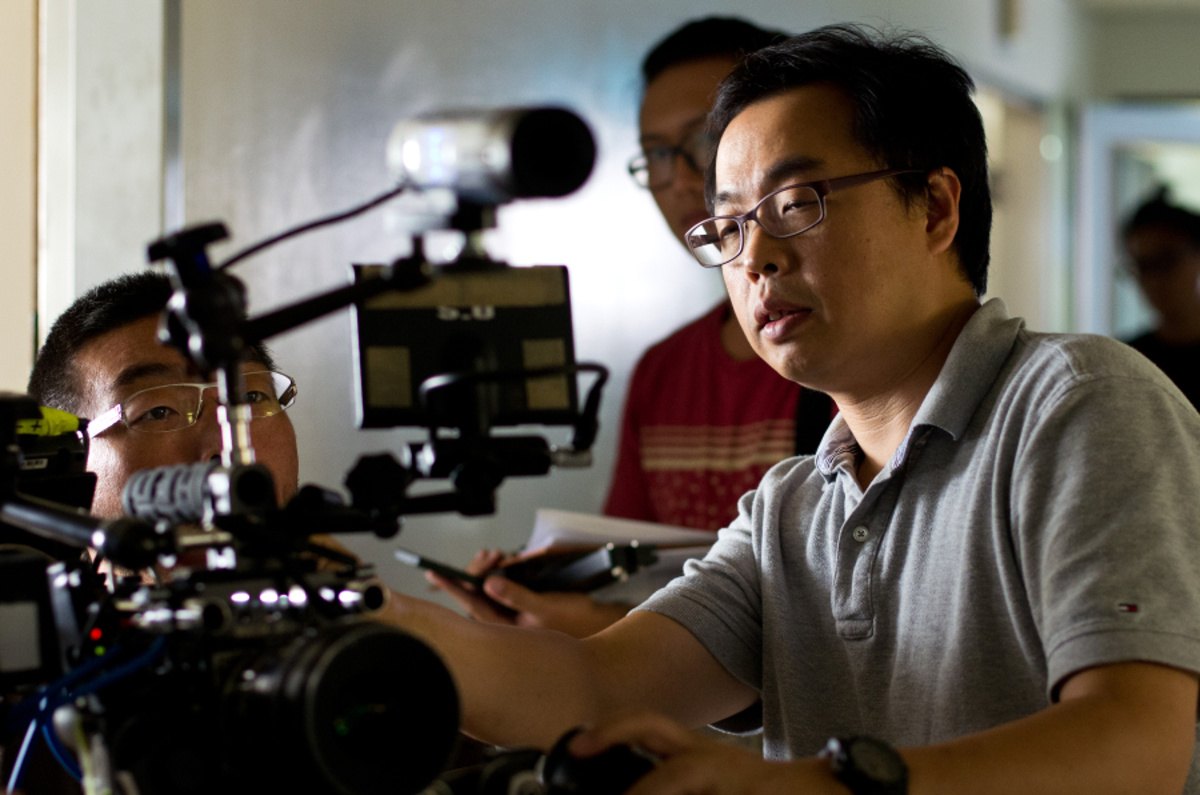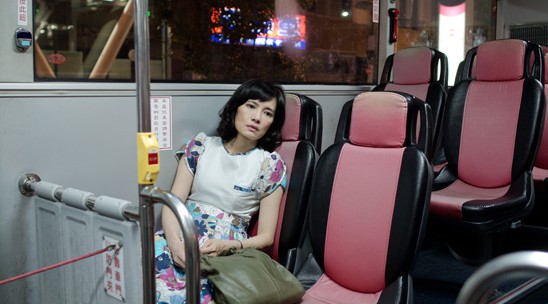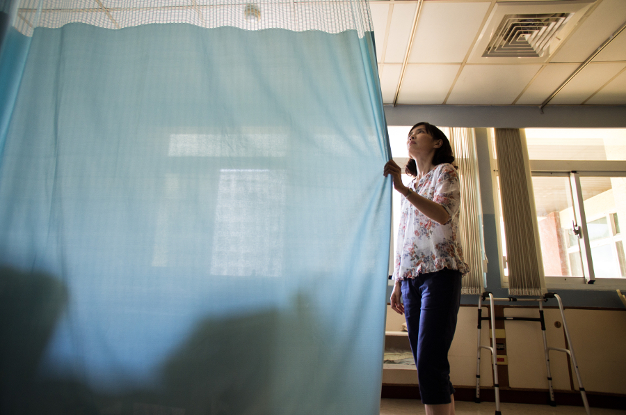Archive - 8th Five Flavours Film Festival
Chienn Hsiang: I prefer to talk in images
 Chienn Hsiang
Chienn HsiangFive Flavours talks with Chienn Hsiang - director, screenwriter and cinematographer of EXIT which is premiered in Poland at the 8th edition of Five Flavours Film Festival in the competition section New Asian Cinema.
Chienn Hsiang is a cinematographer, highly valued in the Taiwanese film circles. He worked with Chen Yu-hsun ("Zone Pro Site"), Chang Ai-chia ("20 30 40"), and Yee Chin-yen ("Blue Gate Crossing") among others. His TV film "Ranger" was nominated for Taipei Awards and received Special Jury Remi Award at WorldFest – Houston IFF. In 2012 Hsiang shot a short feature "The Monad."
Emilia Skiba, Five Flavours FF: I'd want to ask you first what was your inspiration for the story portrayed in "Exit"?
Chienn Hsiang: One day I got on a bus. It was a day like today, very hot. I noticed a woman, about my age, sitting on a chair opposite me. I was looking at her but her gaze was absolutely empty, it was impossible to guess what was she thinking about. She was wearing a jacket, on this very hot day. But looking at her face, her profile, I could say that 20 years ago she must have been a very pretty woman. I was wondering where this girl from 20 years ago disappeared. And I though the girl must be somewhere inside that woman, under this thick shell, inside the body of that 40-something year old woman. I kept on wondering if anybody loved her, who she loved anyone, did she have any sex recently, did she buy new shoes or new clothes for herself, what was her past. That's the background.
And what I try to say by this story, is that there is always some desire inside us, a child that wants to come out. I was thinking what could happen when this child had a real chance to come out.
FF: I guess it must have been a long way from this inspiration to the script – because Ling, the main character, is not a person you were inspired by. How long did it take you to write the final script?
CH: It took me about two years. I wanted Ling to be a normal person.
What is important for my film is that in Asia it's still a man who controls everything – the husband after marriage and the father before marriage. Now China became attractive for the Taiwanese and about one third of Taiwanese men go to mainland China to earn money. And many middle-aged women – even if their husbands are away and children are grown up – stay at home. These women still follow the man's rule, the social obligation. But I think it's the moment when your inner needs, dreams and desires can come out, when you can show your real personality.
But in Taiwan, and I think everywhere in Asia, you have a lot of social obligations. And a married woman should take care of family, including her mother-in-law and father-in-law.
FF: It's interesting that you decided to focus on women in "Exit". The central character is Ling – a middle-aged woman who goes through a lot of changes physically and mentally. Her social position is different than yours as a man. I'm curious what was your biggest struggle to develop a character that seems to be so different than you yourself?
CH: We did a lot of research first. We reached about three hundreds middle-aged women and we've learnt quite a lot from them about their situation.
FF: Were they open about their experiences?
CH: No. Only a small number of them were really open to talk about issues we were interested in. But one of them revealed that if there would be a young man who would touch her, she would go with him right away. But you can see easily that most of them hide themselves away and they cannot come out of the shell. They are used to putting on their very heavy masks.
And when it comes to the script: my producer is a middle-aged woman, Shiang-chyi [Chen Shiang-chyi, the lead actress] is a middle-aged woman. So imagine, if there was any mistake in the script, they pointed it out, explaining me it in details. Because of their input and also the research, I don't really think it's only my film. I absorbed a lot of experiences and information from many women.
With this film I wanted to ask a few questions that occurred to me during the research, for example: Why do we live according social orders that we are uncomfortable with? Why do we have desires and dreams but we don't realise them?
Of course, it doesn't refer only to women. Actually, I'd want men to be a subject of my next film. But in fact, women seem to be more tied up with the social regulations, set up by men. The problem with men is that they are neither happy as they are also involved in all these obligations and rules – but they set them up themselves.
FF: Do you think that the younger generation can get rid of these social burdens? So they can live more according to their own rules?
CH: I'm not sure. On the one hand, they can pursue their dreams more easily. But on the other hand they are entangled in capitalism and consumerism culture what limits and shapes their dreams. It seems that if they would want to fight – it would be a bigger fight that my generation had to go through. Fighting capitalism is more like revolution. On the surface this generation seems to be more equal, also because of the Internet. But there's a huge pressure of money and I think it's what makes their situation very tough.
FF: Getting back to the film – it's focused on Ling, played by Chen Shiang-chyi. Can you tell me a bit how you worked with her on this character?
CH: Chen Shiang-chyi is a wonderful and very talented actress. I think everyone in my generation know her films and for us she is an epitome of a great actress. I always admired her roles in Tsai Ming-liang's films. Besides, she is a very nice person, she doesn't act like a movie star.
What was important for me, she has very strong opinions about her roles, her characters. We discussed a lot before shooting and also every day on the set. We discussed many details, also things like: Would Ling go back? Would she go out? Would she do this or that in this particular situation? Chen Shiang-chyi in "Exit"
Chen Shiang-chyi in "Exit"
FF: In this case, did the story change a lot during the shooting?
CH: No, the general story didn't really change. It's only the end that changed.
An important thing about Chen Shiang-chyi's acting is that she is used to long shots. She didn't like it when I cut a scene too quickly – while I do a lot of cuts. After shooting we had a lot of material so we had to do many cuts anyway but it was a very hard choice what to cut out.
During the shooting we shot more or less everything what was in the script. But there was a lot of discussion about acting. With this pace of acting, without cuts we would end up with a five-hour film! Still, we opted for long shots, we just wanted to let things happen. I wanted to catch Shiang-chyi's feelings and longer shots were perfect for this.
FF: You are also a director of photography. How did it shape the film as a whole and maybe specific scenes?
CH: It helped me a lot. I've been sitting behind the camera for 20 years and I can find best angles to catch what I want, to tell the story. I can also easily choose the best light to catch the mood of the scene. Thanks to it, I'm more focused on the mood than on the technical side – the technical side is like an instinct to me. I'm more like a dancer with a camera. Of course, I don't mean I'm the best cameraman in the world but I have that confidence what lets me to find best angles instinctively.
FF: And was it difficult to switch from being a DOP to being the director and DOP?
CH: Well, I also did scriptwriting. But we had a very low budget so I had no other choice but to do many things myself. I didn't want to put much dialogue in the script because I'm not a very talkative person myself. I prefer to talk in different, non-verbal ways. By images, by showing people's behaviour, by the way they look. I think a DOP can see many things a director cannot see so easily. For example, a DOP can easily guess when an actor lies – for a DOP it's enough to see what is the expression of the actor's eyes. Many directors just check if the line was according to the script and they don't notice when an actor doesn't really want to play it. But a DOP will see it when an actor just recites a line but doesn't really feel it and doesn't want to play it.
FF: That's a very interesting observation.
CH: The whole process is very interesting. A DOP is an outsider and can see easily when an actor pretends to be a character but doesn't want to be this character.
I said that Chen Shiang-chyi is an amazing actress. When she comes to the set, she becomes a character. She starts living another life. For example, when something on the set accidentally falls down, she doesn't hear it. But when there's an ambulance driving with the siren on outside the window of her flat on the set, she just turns her head to check it out, as if that was a part of the script, a part of her life. Chen Shiang-chyi in "Exit"
Chen Shiang-chyi in "Exit"
FF: You told me that you prefer not to express things with words. The relationship and communication between Ling and the man on the hospital bed is very intriguing – they cannot even talk to themselves...
CH: That's right. People tend to talk a lot. But most of it is a lie in one way or another. I think you can express most important feelings without a word, just by the way somebody holds your hand. In so many situations you don't need to talk at all. So often a talk is to modify or cover the truth or to manipulate somebody.
The man in hospital neither cannot see nor hear. When we talked about this role, I asked the actor, Easton Dong, to recall a childhood trauma and recreate it in his groan. I think it was a very difficult thing but it gave this character a sense of veracity. He lied on this bed for two weeks, thinking about his traumas – and I'm sure it was a horrible experience for him.
FF: Actually, he is the only man in the film that we can see and who seems to be important for the story. Other men are absent or not that crucial for the plot. Can you tell me why did you decide to focus so much on women?
CH: Somehow it worked out in this way. It's a story of Ling first of all. I thought about social roles of women – they give birth to children and they also care about the family. Many women get married in their twenties and in many cases it's the end of their youth interpreted as freedom. They are later under the rule of men. And Ling is a middle-aged woman who realises that she still can make up for her lost youth. Thanks to including in the story women at various ages, I could portray their lives in a more complex way.
FF: We already talked about the social roles and using masks that society forces us to put on. Do you think that Ling can be a general reflection of an average middle-aged Taiwanese woman?
CH: In general terms yes. But I don't want to refer this only to women. All of us have social obligations. It's not that men are more free. They also follow social obligations and pressure, it's just a pattern what is different.
FF: You also comment on economic relationships between Taiwan and China in "Exit". But I'd want to ask you about your views about the film industry – how do you see Taiwan-China film cooperation?
CH: There is one crucial difference: there is freedom of speech in Taiwan so I can express what I want. Still, China is a big, dominating country. I wish that, let's say in fifty years, there will be no censorship in China. Once there is freedom of speech, China will have wonderful works of art. When it comes to Taiwan, I think the film industry will shrink with time because Taiwanese films are unable to dominate the market. But now the strength of Taiwanese film industry is freedom of speech and variety which we have thanks to it. I find it very distinctive when it comes to whole Mandarin-speaking world.
Also, in Hong Kong it was action cinema that has developed strongly and it sells well to China. While in China, when you make a film that the censorship won't like – you just shoot it for Europe. Taiwan is the only place where you can shoot both for Europe and mainland China.
FF: As the last thing, can you please explain me the Chinese title?
It's very different from the English version.
CH: We have an old Chinese expression to describe the state of people who are dying but there's just one moment when everything becomes clear and peaceful. Then comes death. This expression to describe this moment can be translated as “returning light” – and it has become the Chinese title of my film. The problem was we couldn't find a good equivalent of this expression in English.
Taipei, July 2014



